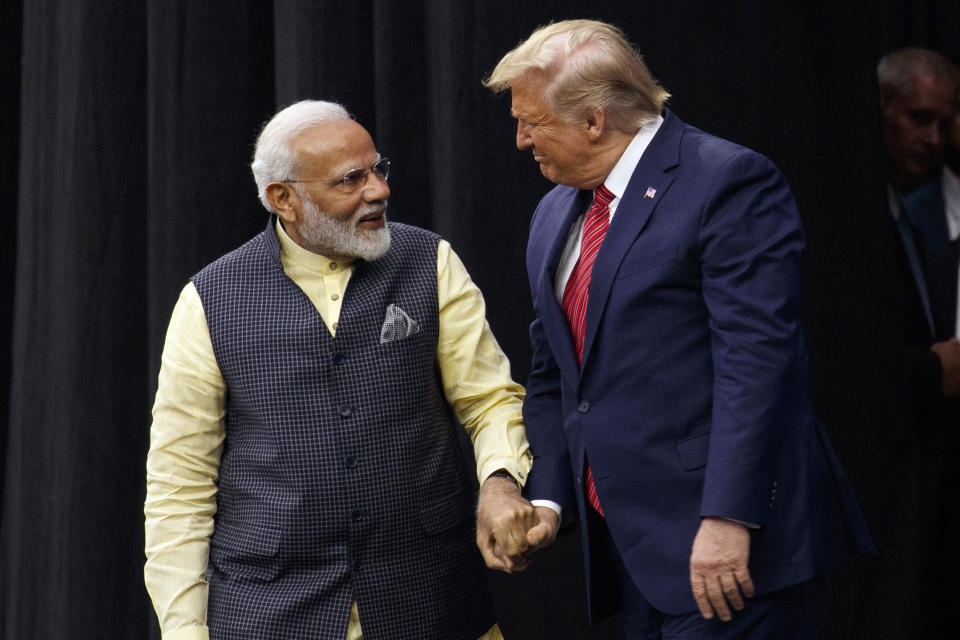US, India talks are 'hot and tense' amid hopes for a trade deal

China’s not the only global power locked in a trade standoff with the United States.
While the Sino-American dispute is casting a shadow over the world economy, experts say the U.S. and India bilateral relationship is equally strained. Expectations of a trade deal are high as Indian Prime Minister Narendra Modi visits the U.S. this week.
In the midst of a bigger fight over tariffs and trade, America is reportedly weighing a limit on the number of Indian immigrants eligible for H1-b work visas. The move is linked to a policy in India that forces U.S. companies to store data locally when they operate there.
The spats over trade, immigration and technology have exposed fissures in a bilateral relationship that sees over $142 billion exchanged annually in goods and services.
Among analysts that monitor the U.S.-India relationship, “it’s still hot and tense,” said Richard Rossow, a senior adviser at the Center for Strategic International Studies.
“It’s not as intense as China because of global repercussions. But its as bad as I’ve seen in the 20-plus years I’ve been working on U.S.-India commercial [ties],” Rossow added.
The tensions are especially important for broader U.S.-India ties, in light of an overall U.S. crackdown on H-1B visas in the technology sector. Indian IT companies which have worked with tech giants like Microsoft (MSFT), Amazon (AMZN) and Google (GOOG) are likely to see the greatest hit by any impact on the H1-B issue.
Meanwhile, IT consulting giants like Tata (TCS.NS), Wipro (WIT), Infosys (INFY) and HCL are all waiting to see how the Trump administration ultimately resolves the tensions.
Although the two countries are longtime allies, India’s stiff tariffs have run afoul of the notoriously trade-skeptic Trump administration.
The relationship worsened after the U.S. refused to exempt India from steel tariffs last year — and got even more tenuous when the U.S. removed a special trade designation that affected over $5 billion of Indian duty-free products.
But India’s trade tensions have affected only a narrow part of the population, which could be motivating Modi to carry on, Rossow said.
‘Howdy, Modi’
India’s strategic and commercial profile has risen since the country emerged in the late 1990s and early 2000s as a technology powerhouse. At the time, the U.S. leaned on the country to help resolve potential Y2K issues, which contributed to its reputation as an ideal outsourcing center.
As India also became call center central for major U.S. tech companies, it fueled controversy domestically over U.S. jobs being shipped overseas.
Reports in India about manufacturing being affected by the trade battle are only just emerging in India. Meanwhile, the broader technology sector, and synergies achieved by both countries, could be in jeopardy.
That is likely what is driving Modi to cooperate with Trump, according to experts — with the former being feted in Houston over the weekend to a massive “Howdy, Modi” rally.
In recent years, the Lone Star State has seen a spike in Indian immigrants, while the majority populate coastal states like New York, New Jersey, California and Washington. Large swaths of Indian-Americans work in technology, pharmacy, and financial services.
“No two countries have benefitted more from the global digital economy than the U.S. and India,” Jacob Gullish, a senior director at the U.S.-India Business Council, told Yahoo Finance.
According to Gullish, India and U.S. are seeing a transition into the third phase of their technology relationship. Officials are now focusing on cooperative development of autonomous programming, robotics and artificial intelligence.
Those areas are something New Jersey Gov. Phil Murphy (D) heard about firsthand on a recent economic trade mission to India.
“Anybody who still thinks of this as the place where you have a call center, has missed a meeting,” he told Yahoo Finance while in Mumbai last week.
He added: “The U.S. is apparently working feverishly to get a deal done with India” — with Canada seen as a beneficiary if India and America don’t strike a deal.

That can only be avoided if the two countries maintain strong economic ties.
Anjalee Khemlani is a reporter at Yahoo Finance. Follow her on Twitter: @AnjKhem
Read the latest financial and business news from Yahoo Finance
